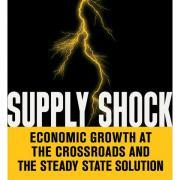Fictitious “Facts” Spur Students to Liquidate the Planet
by Rob Dietz
One reason that we have a culture dedicated to the myth of perpetual economic growth (a dedication that produces a pile of consequences such as climate chaos, financial fiascos, ecosystem eradication, and dismal disparity between the haves and have-nots) is that students are learning fictitious “facts.” College students in the most common majors are repeatedly told that unlimited economic growth is a good thing, with no thoughtful analysis of the costs of growth.
According to the National Center for Education Statistics, the most popular major for U.S. college students is business.(1) A whopping 21% of American undergraduates declared business as their major in the 2007-2008 school year. All of these students take introductory business courses that describe rudimentary principles of economics. After all, the economy is the environment in which businesses operate, so business students need to understand the economy. They learn about supply and demand, business cycles, inflation and unemployment. So when the topic of economic growth comes up in such a course, what sort of message do they receive?
It just so happens that my wife teaches an introductory college business course. She was kind enough to let me borrow the textbook for her course – Exploring Business by Karen Collins – for a quick review.(2) I took a look at it with great interest. Chapter one is called The Foundations of Business, and right at the beginning, I came across a section on economic goals. In this section, Collins states:
All the world’s economies share three main goals:
- Growth;
- High employment; and
- Price stability.
She goes on to explain the concept of prosperity:
During prosperity, the economy expands, unemployment is low, incomes rise, and consumers buy more products. Businesses respond by increasing production and offering new and better products.
For anyone who has studied both the upsides and downsides of economic growth, a statement like, “All the world’s economies have a goal of growth,” raises some red flags. Follow-up statements that equate prosperity with increased consumption raise even bigger and redder flags. These assertions can be rewritten as 2 simple (and unsubstantiated) equations:
- Growth = Number 1 goal; and
- Prosperity = More stuff.
These equations raise the following questions in my mind:
- Should all economies have growth as a goal?
- Isn’t there a deeper meaning of prosperity – don’t we tend to value things in our lives beyond accumulation of more and better products?
- With economic growth straining ecological health around the globe and compromising human health in the high-consuming nations,(3) shouldn’t we at least consider an optimal size for the economy rather than limitless expansion?
Exploration of such questions is not a part of the standard curriculum – Exploring Business doesn’t explore any of them. With so much at stake (after all, a complete understanding of economic growth may help us build economic institutions that fit within ecological capacity), what can we do to help ensure that students obtain a more complete picture of economic growth? Let’s turn to economics for help. If we want professors and textbook writers to supply balanced coverage of economic growth, we need to demand it. We can do so with civility and persistence. These professors and writers aren’t villains – they are simply passing along knowledge, some of which is dangerously misguided, that was handed down to them.
Adbusters Magazine has launched a campaign called Toxic Textbooks to encourage schools and universities to use economics textbooks that engage honestly with the real world. You can get involved with that campaign. You can ask the writers of college textbooks (perhaps starting with Karen Collins) to make some changes. If you’re taking a course in business or economics, you can certainly ask your professor to explain how we can have infinite growth on a finite planet. And if these sorts of attempts fail, perhaps students will begin to select majors that are more in touch with what’s happening in the real world.

What exactly are we learning here?
—
(1) U.S. Department of Education, National Center for Education Statistics, Higher Education General Information Survey (HEGIS), Integrated Postsecondary Education Data System. Note that the second most popular major (with 10.7% of the student population) is social science and history, which includes an awful lot of economics majors who receive similar messages to business students.
(2) Collins, Karen (2010). Exploring Business, Flat World Knowledge.
(3) See, for example, Egger, Garry and Boyd Swinburne, 2010. Planet Obesity: How We’re Eating Ourselves and the Planet to Death, Allen & Unwin.
 Rob Dietz brings a fresh perspective to the discussion of economics and environmental sustainability. His diverse background in economics, environmental science and engineering, and conservation biology (plus his work in the public, private, and nonprofit sectors) has given him an unusual ability to connect the dots when it comes to the topic of sustainability. Rob is the author, with Dan O’Neill, of Enough Is Enough: Building a Sustainable Economy in a World of Finite Resources.
Rob Dietz brings a fresh perspective to the discussion of economics and environmental sustainability. His diverse background in economics, environmental science and engineering, and conservation biology (plus his work in the public, private, and nonprofit sectors) has given him an unusual ability to connect the dots when it comes to the topic of sustainability. Rob is the author, with Dan O’Neill, of Enough Is Enough: Building a Sustainable Economy in a World of Finite Resources.






Any coincidence that Exploring Business is published by Flat World Knowledge? ;)
Exploring Business was published by “Flat World Knowledge”?! Well, that about sums it up, don’t it. ;)
Why dontcha write to Collins and see if she engages, and publish the conversation here?
I am betting that most econ careers depend on not understanding the problems you outline, and so they continue to blabber same old same old.
Perpetual growth and capitalism are certainly both recipe for disaster.
But do you really expect efforts like this to make a dent? People don’t major in economics naively looking to be told how the world works. They major in economics to get their feet in the doors of capitalism’s boardrooms and counting houses.
Power isn’t merely a verbal game. We aren’t going to circumlocute our way to saving the world.
P.S. Vera is right about teachers, too. These people are true believers and will lauch their asses off at gesture-makers like Adbusters.
I must defend teachers here – I have used Adbusters in lessons many times and think it’s a great organization. Two of my crowning moments as a teacher were thus: during a unit on economics where we looked at supply and demand and the true cost of goods (where I used lots of supplemental material, like 60 minutes “Harvest of Shame”) a student approached me and said that her mom had taken her shoe shopping that weekend, and she couldn’t pick anything out because she kept thinking about the people who made them and the fact that she didn’t actually NEED shoes. In the middle of another unit about social and media pressure on teens, we were discussing the ways that teens are manipulated to spend their money and one of my students moaned, “Ms P, you’re ruining MTV for me”. So maybe we can change things, slowly.
BTW, those were 8th graders I was teaching, not college students.
“Flat World pub”- that is too funny, and a sad irony. In my last year of a grad program in a class on Sustainable Development. The professor, a Bulgarian woman educated in Germany, gave us some great readings, including Herman Daly´s Beyond Growth. However, she lamented at one point that she wishes the students in her program had conventional economics classes in the program.
I begged to differ, and suggested that her class in Sus Dev was the best place to start with in the first place.
It has occurred to me that an effort to approach environmental clubs at colleges around the country might be one strategy. In my occasional visits to undergraduate clubs, I had no indication that even those interested younger gen´s were getting exposed to this mental clarity. Sierra Club and Audobon Society might be involved in quite a few cases, I would guess.